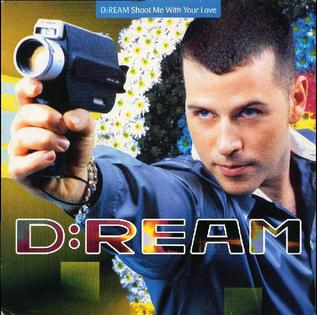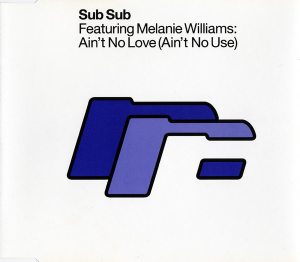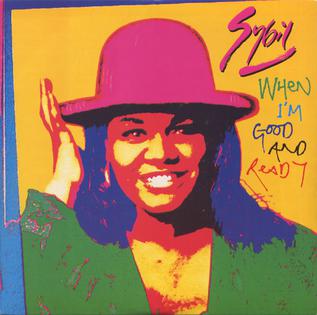
"What's Up?" is a song by American rock group 4 Non Blondes, released in March 1993 by Interscope and Atlantic Records as the second single from their debut album, Bigger, Better, Faster, More! (1992). The song was written by lead singer Linda Perry and produced by David Tickle. It has gained popularity in the United States and in several European countries, peaking at number one in Austria, Belgium, Denmark, Germany, Iceland, Ireland, the Netherlands, Norway, Poland, Sweden, and Switzerland. The accompanying music video was directed by American film director Morgan Lawley and was also nominated in the category for Best Alternative Rock Video at the MTV Video Music Awards.

"Jump Around" is a song by American hip hop group House of Pain, produced by DJ Muggs of Cypress Hill, who has also covered the song, and was released in May 1992 by Tommy Boy and XL as the first single from their debut album, House of Pain (1992). The song became a hit, reaching number three in the United States. A 1993 re-release of the song in the United Kingdom, where the initial release had been a minor hit, peaked at number eight.
D:Ream is a Northern Irish/English pop & dance group. They had a UK No. 1 hit with "Things Can Only Get Better" in 1994. Eight more top 40 hits followed, including "U R the Best Thing" and "Shoot Me with Your Love". Their two 90s studio albums reached the UK top five.

"Come Baby Come" is a song by American rapper K7 featuring vocals by Camille, released by Tommy Boy Records as the first single from the rapper's debut album, Swing Batta Swing (1993). The song peaked at numbers 18 and 15 on the US Billboard Hot 100 and Cash Box Top 100 in December 1993, and number three on the UK Singles Chart in January 1994. It was produced by Joey Gardner and received positive reviews from music critics. The song was also certified gold by the Recording Industry Association of America (RIAA) on November 17, 1993. The accompanying music video was directed by Hype Williams and filmed in Jersey City, New Jersey.

"'Movin' On" is a song written and performed by English girl group Bananarama. Released on 17 August 1992, it was the first single from their sixth album, Please Yourself (1993). It was produced by Mike Stock and Pete Waterman, two-thirds of the Stock Aitken Waterman (SAW) trio who had produced a number of Bananarama's past hits.

"Moving On Up" is the seventh overall single from British band M People, and the second single from their second album, Elegant Slumming (1993). Written by band members Mike Pickering and Paul Heard, and produced by M People, it was released on 13 September 1993 by Deconstruction. The song peaked at number two on the UK Singles Chart and number one on the UK Dance Singles Chart and was the biggest selling M People single. It also became a top-40 hit on the US Billboard Hot 100 and peaked at number one on the Billboard Dance Club Songs chart. The accompanying music video for the song sees the band performing in a club.

"Can't Get Enough of Your Love, Babe" is a song written, recorded, and produced by American musician Barry White. Released in June 1974 as the first single from his third album, Can't Get Enough (1974), the song topped the US Billboard Hot 100 and Billboard R&B charts. It became one of White's signature tunes and achieved gold record status in the US. It was also his second American chart-topper, after "Love's Theme".

"Let Me Be Your Fantasy" is a song by British musical group Baby D. It was written and produced by band member Floyd Dyce and the vocals were sung by Dorothy Fearon. It was originally released by Production House Records in October 1992, when it reached No. 76 on the UK Singles Chart. In November 1994, London Records subsidiary Systematic re-released the song, and it subsequently became a UK No. 1 hit for two weeks. A partially black-and-white music video was produced to promote the single.

"Shoot Me with Your Love" is a song by Northern Irish music group D:Ream, released in June 1995 by Magnet and FXU as the first single from their second album, World (1995). Co-written by frontman Peter Cunnah with Tim Hegarty, the song was the first of a three-single UK Top 40 run in 1995 for the band and also the highest peaking, reaching number seven on the UK Singles Chart and number three on the UK Dance Singles Chart. The follow-ups, "Party Up the World" and "The Power ", reached number 20 and 40, respectively. A music video was also produced to promote the single.

D:Ream On Volume 1 is the debut album by Northern Irish pop/dance band D:Ream. It was released in late 1993 by Magnet Records label, distributed by Warner Music major, and managed by FXU Management. The album includes D:Ream's biggest hit single, "Things Can Only Get Better", which reached number one in the UK Singles Chart in 1994. The album also includes the song "U R the Best Thing", which was released three times in total. In 1994, the track was remixed, and managed to get to number 4.

World is the second studio album by Northern Irish synthpop / dance band D:Ream, released in 1995. It was to be the band's final studio release before their disbanding in 1997, and their re-forming in the late 2000s.

The Best of D:Ream was the first official compilation album from Northern Irish pop/dance band D:Ream, issued by Magnet Records label, and distributed by major Warner Bros. Records, with the management of FXU. It was released in May 1997, just after their UK and U.S. Dance Number 1 hit, Things Can Only Get Better, was re-released for the second time, re-entering the UK Top 20 Singles Chart at Number 19. The song received much publicity from the fact that it was later adopted by the UK Labour Party as their theme for the 1997 UK General Election. The group's record company, in agreement with leader Peter Cunnah, who decided to call it quits with D:Ream, chose to issue this greatest hits collection, instead of their third studio album, which was to be called Heap of Faith, and has since never been released.

"Got to Get It" is a song by German group Culture Beat from their second studio album, Serenity (1993). The song was written by Nosie Katzmann, Jay Supreme, Torsten Fenslau and Peter Zweier, and produced by Fenslau. The lyrics describes the feeling of not getting over someone you once were in love with, hence the refrain Got to get it, got to get it out of my head. It was released as the second single from the album on 13 September 1993 by German label Dance Pool and was a hit in most European countries, peaking at number-one in both Belgium and Finland. The single was also a top-five hit in Denmark, Germany, Ireland, Italy, Lithuania, Spain, Sweden, the Netherlands and the UK. In the UK, the US and Canada, the song peaked at number one on the dance music charts. Its music video was directed by Martin Person and filmed in Denmark and Portugal, telling the story of two lovers breaking up.

"Ain't No Love (Ain't No Use)" is a song by British dance music act Sub Sub, released on 29 March 1993 by independent label Rob's Records as the second single from their debut album, Full Fathom Five (1994). It features Temper Temper's Melanie Williams on vocals. The song was the act's biggest single, reaching number three on the UK Singles Chart and number one on the UK Dance Singles Chart; it became one of many dance singles in 1993 to cross over into mainstream popularity in the UK. In the accompanying music video, Jimi Goodwin plays bass, Jez Williams plays keyboards and percussion, and Jez' twin brother Andy Williams plays keytar. After struggling to repeat the success of the single, and after a fire destroyed the band's Ancoats studio in 1996, the group eventually reformed with a radically different sound as Doves in 1998.

"If I Ever Lose My Faith in You" is a song by English singer-songwriter Sting, released on 1 February 1993 by A&M Records as the lead single from his fourth studio album, Ten Summoner's Tales (1993). The song reached number 17 on the US Billboard Hot 100 and the top 40 in several European countries. In Canada, the song reached number one, spending three weeks atop the RPM 100 Hit Tracks chart and finishing 1993 as Canada's fourth-most-successful single.

"When I'm Good and Ready" is a song by American R&B and pop singer-songwriter Sybil, released on March 8, 1993 by PWL International and FFRR, as the first single from her fifth album, Good 'N' Ready (1993). Written and produced by Stock/Waterman, it also features backing vocals by Mae McKenna, Stock and Miriam Stockley. It went on to become one of her most successful songs and a major hit on the charts in Europe, reaching the top 10 in the UK and Ireland, and was a top-20 hit in Austria and a top-50 hit in Germany. In 1997, "When I'm Good and Ready" was re-released in a new remix by UK remix, production and songwriting team Love to Infinity, which achieved a moderate success on the national chart.

"U R the Best Thing" is the debut single of Northern Irish musical group D:Ream, included on their first album, D:Ream On Volume 1 (1993). Originally a club hit released in 1992, the song has been remixed and re-released twice: in 1993 and in 1994. The 1994 version, also known as the Perfecto mix, was most successful peaking at number three in Scotland, number four on the UK Singles Chart and number six in Ireland. It also peaked at number 13 on the Eurochart Hot 100. The 1993 version reached number one on the Billboard Hot Dance Club Play chart in the US. There were made three different music videos to promote the single; the 1994 version was directed by Marcus Nispel.

"Blame It on Me" is a song by Northern Irish musical group D:Ream, released in August 1994 by Magnet, FXU and Warner Music UK as the sixth and last single from the group's debut album, D-Ream On Volume 1 (1993). The song is written by frontman Peter Cunnah and features backing vocals by Jamie Petrie and Linda Duggan. Produced by Tom Frederikse, "Blame It on Me" received favorable reviews from music critics, peaking at number 25 on the UK Singles Chart and number 15 on the UK Dance Singles Chart.

"Unforgiven" is a song by Northern Irish musical group D:Ream, released in July 1993 by labels Magnet and FXU as the third single from their debut album, D:Ream On Volume 1 (1993). Written by band members Peter Cunnah and Al MacKenzie, it was produced by the group with Tom Frederikse. It peaked at number 29 in the UK and number ten in Portugal. After the success of the singles "U R the Best Thing" and "Things Can Only Get Better", "Unforgiven" was re-released in 1994. A music video was also produced to promote the single.



















